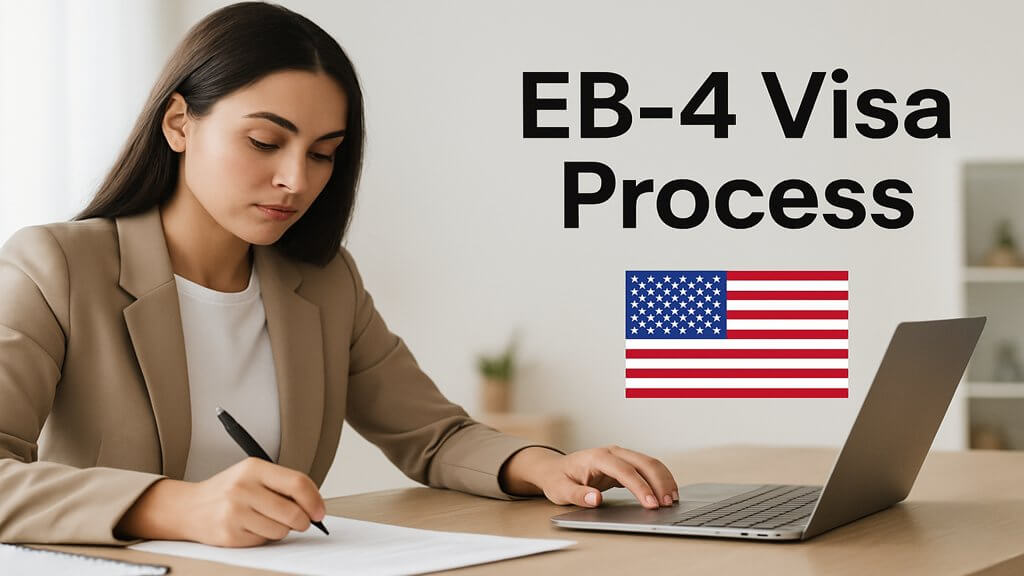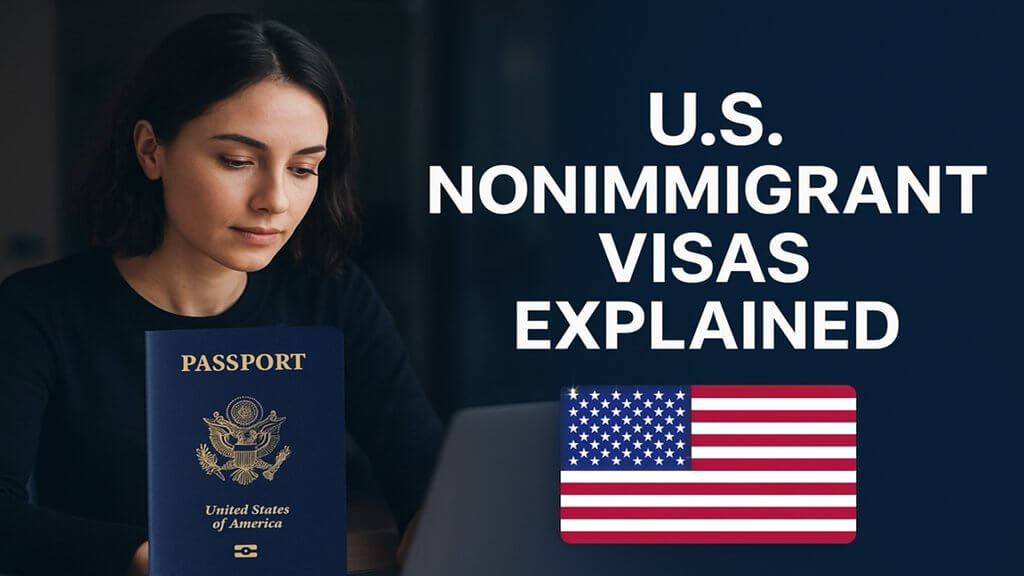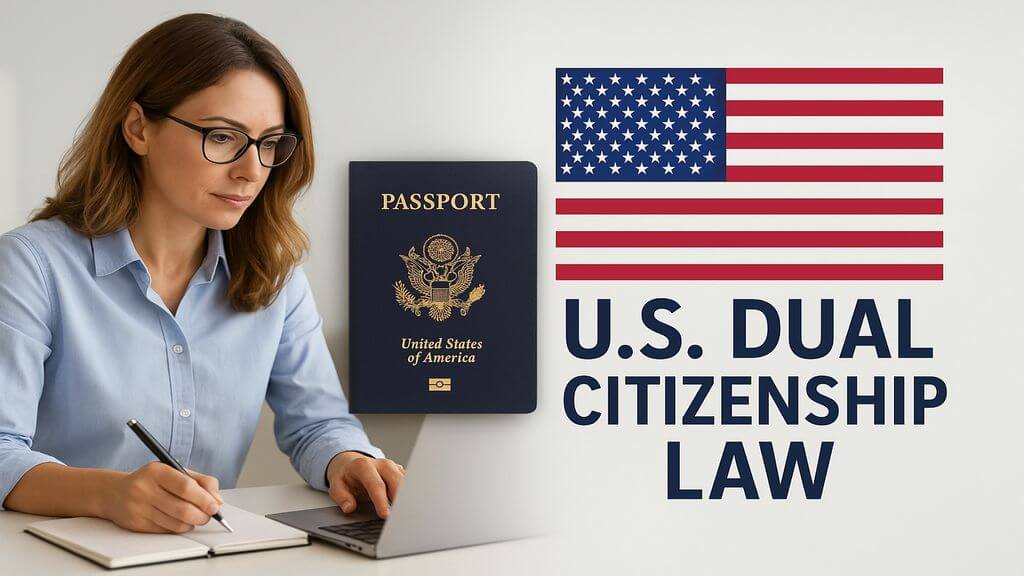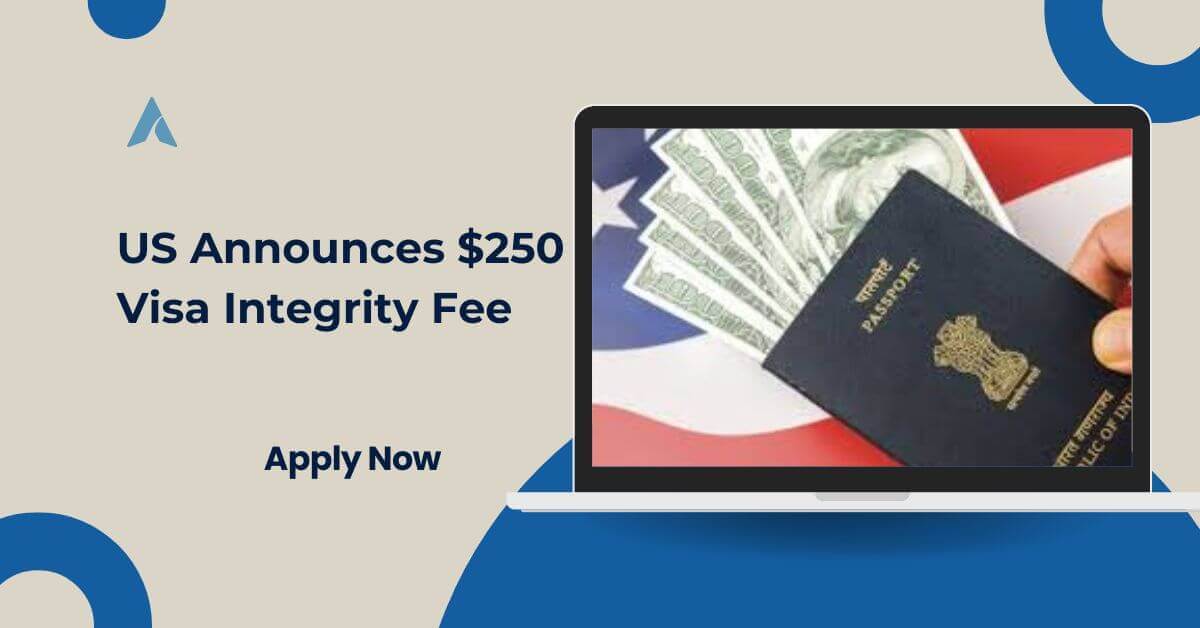The EB-4 visa is a U.S. employment-based immigrant visa that provides a path to permanent residency (Green Card) for individuals classified as “special immigrants.” This includes religious workers, military service members, certain physicians, and employees of international organizations, among others.
This guide covers EB-4 eligibility, fees, processing times, required documents, and step-by-step application procedures based on the latest 2025 updates.
Introduction:
The EB-4 visa is part of the employment-based fourth preference (EB-4) category, administered by the U.S. Citizenship and Immigration Services (USCIS). It is designed for individuals in specialized categories who typically do not fit into traditional employment-based visa tracks.
Approved EB-4 applicants receive U.S. lawful permanent resident (Green Card) status. Their spouse and unmarried children under 21 may also be eligible for green cards.
Read Also: U.S. EB-1 Visa Explained – Immigration Path for Individuals
Eligibility Categories:
To qualify for an EB-4 visa, applicants must fall under one of the following special immigrant categories:
| Category | Description |
|---|---|
| Religious Workers | Ministers or members of a religious denomination working in a religious vocation or occupation. |
| Broadcasters | Employed by U.S.-based international broadcasting entities like the Voice of America. |
| Certain Physicians | Practicing medicine in underserved areas under specific conditions. |
| Employees of International Organizations | Workers for organizations like the UN or World Bank continuing their service in the U.S. |
| Armed Forces Members | Individuals with honorable service (typically 12+ years) in the U.S. military. |
| Afghan or Iraqi Translators/Interpreters | Provided faithful service to the U.S. government in conflict zones. |
| Special Juveniles | Minors who are declared dependent on a juvenile court and eligible for long-term care in the U.S. |
Visa Fees:
Filing fees vary depending on whether you are applying from within the U.S. or from abroad.
If applying within the U.S. (Adjustment of Status):
- Form I-360 (Petition): $515
- Form I-485 (Adjustment of Status): $1,440
- Immigrant Fee (after approval): $235
If applying outside the U.S. (Consular Processing):
- Form I-360 (Petition): $515
- Form DS-260 (Visa Application): $345
- Form I-864 (Affidavit of Support, if required): $120
- Immigrant Fee: $235
Special Immigrant Visa:
The Special Immigrant Visa (SIV) in the USA is a unique immigration category that allows certain non-citizens to obtain lawful permanent residence (Green Card) based on specialized employment, service, or humanitarian reasons.
This visa is commonly issued to:
- Religious workers (EB-4 visa)
- Afghan and Iraqi nationals who supported U.S. missions
- Special immigrant juveniles (SIJ)
- Broadcasters, certain international organization employees, and more
Unlike traditional employment-based visas, special immigrant visas are reserved for individuals in defined roles with special qualifications or circumstances recognized by U.S. immigration law.
EB-4 Visa for Religious Workers:
One of the most common uses of the EB-4 visa is for religious workers. This category is available to individuals who:
- Have been a member of a recognized religious denomination for at least two years
- Are coming to the U.S. to work full-time as a minister, clergy, or in a religious vocation or occupation
- Have a job offer from a qualified religious organization in the U.S.
Requirements:
- Valid evidence of religious affiliation and employment
- Sponsorship by a nonprofit religious organization
- Proof of compensation (salaried or non-salaried)
The EB-4 visa for religious workers allows eligible individuals to apply for permanent residence and eventually U.S. citizenship.
Note: The non-minister religious worker program is subject to expiration and renewal by Congress—always check the latest USCIS updates.
Processing Times:
Processing times vary by category, nationality, and individual case factors:
| Step | Estimated Time |
|---|---|
| Form I-360 Approval | ~3–6 months (may vary by category) |
| Visa Availability Wait | Depends on country and category quota |
| Form I-485 (U.S. applicants) | ~7–12 months |
| Consular Interview (abroad) | ~6–9 months post-approval |
How to Apply for EB-4 Visa Process 2025?
Step 1: File Form I-360
- The sponsoring employer or organization submits Form I-360, Petition for Amerasian, Widow(er), or Special Immigrant.
- Required documents depend on your category (e.g., religious certification, proof of military service).
Step 2: Wait for Approval and Visa Availability
- Once Form I-360 is approved, the applicant must wait for a visa to become available under the applicable annual cap.
Step 3: Adjust Status or Consular Processing
- If already in the U.S., file Form I-485 to adjust status.
- If abroad, complete Form DS-260 and schedule an interview at a U.S. consulate.
Step 4: Attend Medical Exam and Interview
- Applicants must pass a medical exam and an immigration interview.
- Additional background and security checks are conducted.
Document Checklist:
Here’s a general list:
- Form I-360
- Proof of category eligibility (e.g., ordination certificate, military records, UN employment letter)
- Valid passport
- Passport-size photographs
- Birth certificate
- Marriage certificate (if applicable)
- Police clearance certificates
- Form I-864 (Affidavit of Support, if applicable)
- Medical exam (Form I-693)
- Proof of lawful U.S. entry (for adjustment of status)
Always consult the official USCIS checklist or a qualified immigration attorney for case-specific guidance.
Navigating the EB-4 Process:
U.S. immigration can be complex. Whether you’re a religious worker, an employee of an international agency, or a military service member understanding eligibility, forms, and timelines is critical.
If you’re not sure whether EB-4 is the right fit for you, consult:
- A USCIS-approved immigration attorney
- The official USCIS EB-4 visa guide
Frequently Asked Questions:
-
What is the EB-4 visa?
The EB-4 visa is a U.S. employment-based green card for individuals in specific “special immigrant” categories, such as religious workers, members of the U.S. armed forces, international organization employees, broadcasters, and others.
-
Can I apply for an EB-4 visa without an employer?
Yes, some EB-4 applicants can self-petition, such as religious workers and certain special immigrant juveniles. However, most applicants will require a sponsoring organization or employer.
-
Can I bring my family with me?
Yes. Your spouse and unmarried children under 21 may be eligible for green cards as your derivative beneficiaries under the EB-4 visa.






